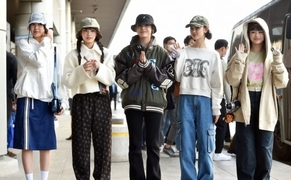 |
| The lights are off in a lecture room of a medical school in Seoul. Medical professors will start voluntarily submitting their resignations from Monday,/ Photographed by Song Eui-joo |
AsiaToday reporter Ji Hwan-hyuk
Medical school professors will begin tendering their resignations from Monday in protest of the government’s plan to admit 2,000 more students to medical schools per year. The government are determined to suspend the licenses of the striking trainee doctors who defied the government’s return-to-work order, starting from Tuesday at the earliest. Conflicts between the government and doctors are expected to peak this week.
“We can take administrative and legal action against the striking trainee doctors as there are laws and principles,” Sung Tae-yoon, director of national policy at the presidential office, said during a recent appearance on a TV program. “But, if possible, the government wishes not to take such steps,” he said, urging trainee doctors to return to their respective hospitals before the procedure to suspend their licenses is completed. “We ask you again to come back to work as soon as possible and never leave patients unattended before the procedure is completed,” he said.
The government has reaffirmed its commitment to medical reform. The Ministry of Health and Welfare plans to suspend licenses for up to three months to striking trainee doctors who defied the government’s return-to-work order, starting from Tuesday at the earliest. The deadline for submitting opinions of trainee doctors who received the prior notice of suspension of license early this month is March 25.
The medical community says it will protect the nation’s medical care by all means starting this week. The Medical Professors Association of Korea, in which 39 out of a total of 40 medical schools nationwide participate, announced that starting from Mar. 25, they have decided to limit outpatient, surgical and inpatient care within 52 hours per week. Additionally, from the following month, they aim to reduce outpatient care to ensure that emergency and severe patients receive stable care. The emergency committee of the Medical Professors Association of Korea also said they will submit resignation letters starting Monday. The committee said it will actively support the proposal of the association, including working 52 hours a week and minimizing outpatient care, and support professors’ collective action.
The Korean Medical Association (KMA), which elects its new chairman on Tuesday, is expected to continue its fierce struggle, led by the hardliner chairman. The turnout of the first round of voting for the 42nd presidential election held last week was 66.46 percent, the highest since the introduction of the direct election system of the KMA. In the first round of voting, candidates Lim Hyun-taek, president of the Korean Pediatric Association, and Joo Soo-ho, the head of the emergency committee’s public relations council, ranked first and second, respectively. As both are representative candidates of hardliners, chances are high that they will take full-fledged collective action, with the election of the next chairman on Tuesday.
#conflict #medical reform #professors #trainee doctors
Copyright by Asiatoday
Most Read
-
1
-
2
-
3
-
4
-
5
-
6
-
7





















